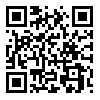مجله رویش روانشناسی از دادن گواهیهای کاغذی معذور است. لطفا تقاضا نکنید. همه گواهی ها در صفحه شخصی کاربران موجود است.
year 11, Issue 4 (Summer 2022 2022)
Rooyesh 2022, 11(4): 181-192 |
Back to browse issues page
Download citation:
BibTeX | RIS | EndNote | Medlars | ProCite | Reference Manager | RefWorks
Send citation to:



BibTeX | RIS | EndNote | Medlars | ProCite | Reference Manager | RefWorks
Send citation to:
Bakhshipour A, Nourollahi S. (2022). Analysis of High School students's perception on academic failure in COVID-19 Pandemic: Qualitative Study. Rooyesh. 11(4), 181-192.
URL: http://frooyesh.ir/article-1-3612-en.html
URL: http://frooyesh.ir/article-1-3612-en.html
1- Assistant Professor, Department Of Counseling, Faculty Of Education And Psychology, Islamic Azad University of Bojnourd, Bojnourd, Iran. , Ab8boj@gmail.com
2- Ph.D Student. Department Of Counseling, Faculty Of Education And Psychology, Islamic Azad University of Bojnourd, Bojnourd, Iran.
2- Ph.D Student. Department Of Counseling, Faculty Of Education And Psychology, Islamic Azad University of Bojnourd, Bojnourd, Iran.
Abstract: (4518 Views)
Covid-19 pandemic conditions have affected various aspects of students' lives, One of the most important effects in the field of education is academic failure. In-depth and extensive research is needed to investigate the factors affecting academic failure in the Covid-19 pandemic. Therefore, the purpose of this study is to investigate the perceptions of high school students who have suffered quantitatively or qualitatively in the covid-19 pandemic than before. The method of this study is qualitative and with a descriptive phenomenological approach and semi-structured interviews have been used to collect data. Using criterion-based purposive sampling, after 10 interviews with eighth to eleventh-grade students in Mashhad in 1400, the results were saturated. An in-depth analysis of students' perspectives showed that various factors have influenced their academic failure during the pandemic. Which includes three axes: individual, environmental and educational. Individual focus includes distraction, nervousness, Depression, stress (psychological problems), Decreased quality of learning, motivation, cheating, poor reading, shortening of time (learning), And playfulness, electronic games, harmful information, and virtual. Environmental factors include school, recreation (uplifting environments) and family behavior, friends, and classmates (relatives). Educational factors include Internet problems, problems with educational software (educational platform), low quality of teaching, change in class hours, teacher disorder, and teacher non-response. It is recommended that those in charge of this matter try to improve the quality of education, improve the virtual education capability of teachers, take care of mental health and increase the skills of students to be more adaptable to these conditions.
Type of Article: Research |
Subject:
Educational Psychology
Received: 2022/02/13 | Accepted: 2022/06/27 | ePublished: 2022/07/1
Received: 2022/02/13 | Accepted: 2022/06/27 | ePublished: 2022/07/1
Send email to the article author
| Rights and permissions | |
 |
This work is licensed under a Creative Commons Attribution-NonCommercial 4.0 International License. |






